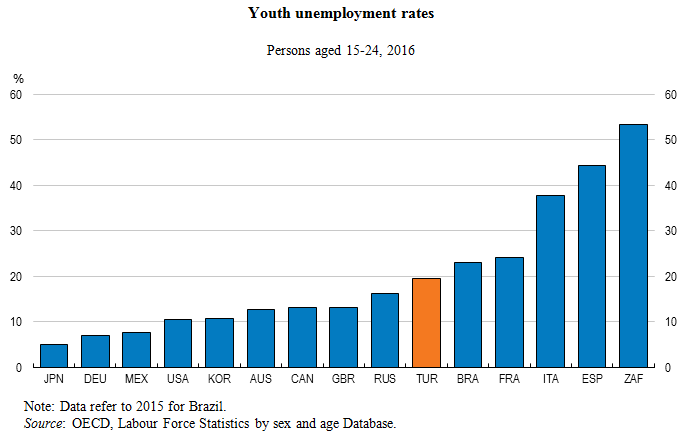Productivité et croissance à long terme
Going for Growth 2018 - Turkey note
Going for Growth is the OECD flagship report analysing structural policy settings and economic performance to provide policymakers with concrete reform recommendations to boost growth and ensure that the gains are shared by all. The 2018 Interim Report reviews the main growth challenges and takes stock of reforms enacted over the past year -- in both advanced and emerging economies -- on policy priorities identified in the previous issue of Going for Growth.
Country highlights
The income gap vis-à-vis most advanced OECD countries continues to narrow, but now at a reduced pace. Rising labour force participation and job creation, mostly in service sectors, have strongly improved employment rates, but labour productivity growth is decelerating. Broad-based job creation for the low-skilled, including in less advanced regions, have contributed to reduce absolute poverty and inequality but the share of national income held by the poorest still remains below the OECD average.
Reforms in education, as well as of labour and product markets are necessary. Upskilling the labour force and easing the shift of low-skilled workers from low-productivity and informal jobs to higher-productivity one in formal sectors would significantly boost average labour productivity, human capital formation, notably for young workers, and social inclusion.
Going for Growth 2017 recommendations include:
- Improve educational achievement at all levels by reducing the wide quality gaps persisting among schools, school types and universities, by granting them more autonomy and resources per student against greater performance accountability. Further develop pre-school education. Continue to strengthen vocational education in co-operation with the business sector and evaluate the outcomes of the many recent initiatives in this area.
- Reduce the cost of employment of the low-skilled by keeping the growth of the official minimum wage below average productivity gains for a while. Allow regional differentiation of minimum wages through local consultations between government, employer and employee representatives. Grant further social contribution cuts for low-skilled workers in the entire country, financing them by widening the tax base.
- Reform employment protection legislation and strengthen active labour market policies by implementing the labour market reforms in the 2016 Action Plan of structural reforms. Replace the costly severance payment regime available only for a minority of formal sector workers. Liberalise fixed-term contracts. Improve the social safety net for displaced workers by making public support for retraining and job search more reliable for those out-of-work.
- Improve competition in network industries and agriculture by identifying the remaining obstacles to the opening of network sectors to competition, with the help of an OECD Competition Assessment Review. Delink agricultural support from production and shift its composition away from price measures towards direct support.
- Encourage formal work at older ages by making continuing work in the formal sector after official retirement age more attractive and actuarially neutral. Speed up increases in the statutory retirement age. Establish a health insurance contribution for young retirees.
Recent policy actions in these areas include:
- Labour costs have been reduced by a decrease in employers' social security contributions, from 14% to 9% of gross wages. Moreover, for firms that have increased their net employment over 2016, new hiring will be exempt of social security contributions for one year.
Turkey: Latest Economic Forecast
Documents connexes
